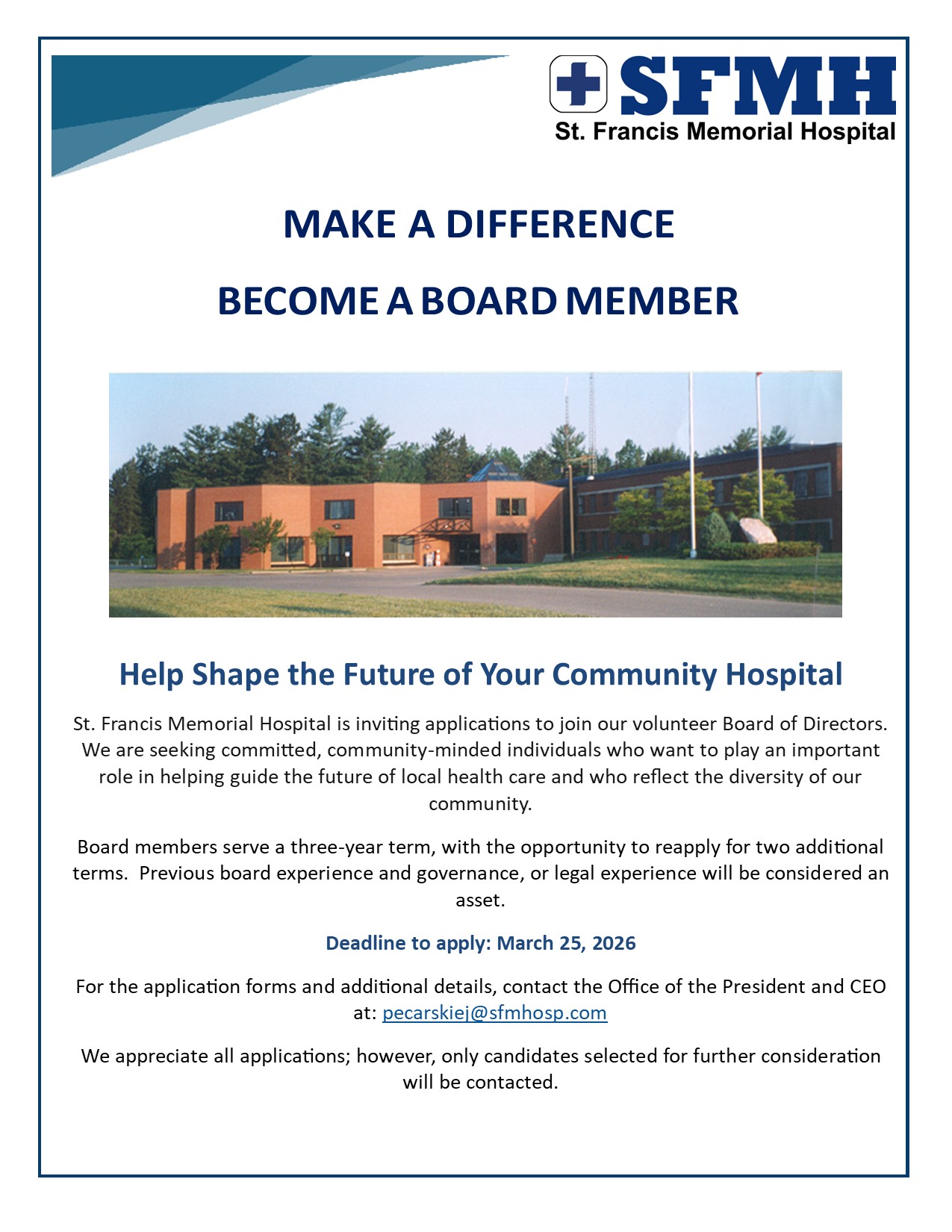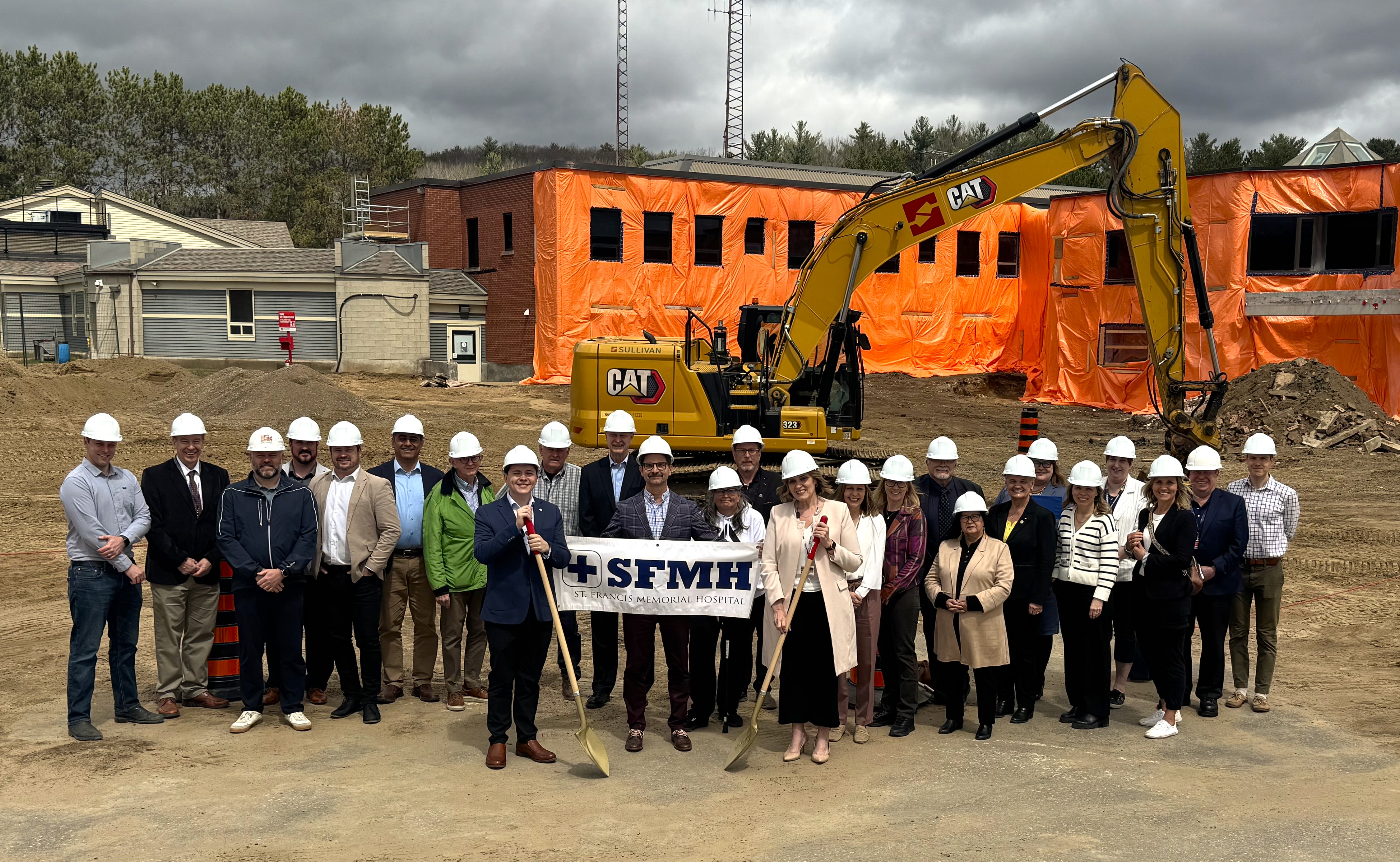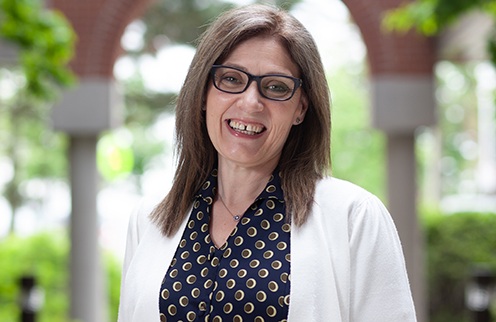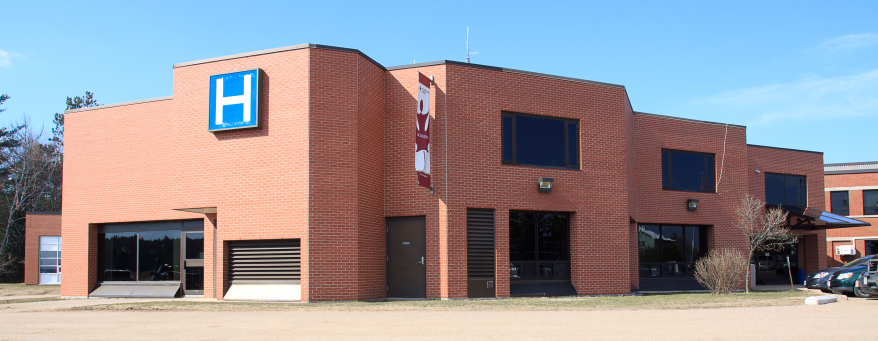



“Our government is protecting Ontario’s health care system and ensuring that more people in Renfrew County can connect to convenient emergency care, where and when they need it most,” said Sylvia Jones, Deputy Premier and Minister of Health. “By investing in a new and expanded St. Francis Memorial Hospital emergency department, we are making it faster and easier for more people and their families to access high-quality emergency and ambulatory care in their community, for years to come.”
“We are extremely pleased with the progress to date,” said Suzanne Madore, President and CEO of SFMH. “This project promises to uphold the future of excellent health care in our community for decades to come.”
The project, awarded to M. Sullivan & Son Limited Construction will result in a new state of the art Emergency Department and redevelop existing hospital space for Ambulatory Care. M. Sullivan and Son Ltd. is an experienced builder with extensive related experience based out of Arnprior.
The project includes a 6,000 square foot addition (new emergency department) as well as 6,600 square feet of renovations to the first floor of the hospital. The plans for this project have been developed over many years, with the assistance of N45 Architecture, physicians, hospital staff and the Patient and Family Advisory Committee.
Once opened, the new state-of-the-art emergency department will include:
Kevin Quade, Chair of the SFMH Board of Directors expressed, “On behalf of our Board of Directors, I would like to thank: the St. Francis Valley Healthcare Foundation, our generous donors, volunteers, patient and family advisors, hospital staff, physicians, and all those who have worked diligently for this day to come. This project supports the hospital vision to be a leader in health services that are patient centred, integrated and responsive to rural community health needs.”
SFMH will continue to offer normal services throughout the duration of the project which is expected to take two years to complete. While SFMH will do it’s best to minimize interruptions, COO Greg McLeod notes there will be some minor modifications to the site at various stages of the project. “We will ensure new, bright signage is in place to assist with these changes”, says McLeod. SFMH is grateful for the support and understanding of the community as we work to complete this important project.
 Suzanne Madore, new President & Chief Executive Officer of RVH and SFMH
Suzanne Madore, new President & Chief Executive Officer of RVH and SFMH
Suzanne Madore comes to RVH and SFMH with a distinguished career in healthcare, having devoted over 30 years of exemplary service in various leadership roles at The Ottawa Hospital (TOH). Her extensive experience, coupled with her unwavering dedication to patient-centred care, positions her to guide our hospitals with expertise and compassion.
Suzanne’s journey in healthcare began at the front lines as a Registered Nurse, where she developed a deep understanding of patient care. Over the years, she has held a series of key leadership positions, including Clinical Director of the Regional Cancer Program, and Executive Vice President, Chief Operating Officer, and Chief Nursing Executive at TOH.
Throughout her career, Suzanne’s leadership has been marked by a commitment to excellence, collaboration, and a deep sense of responsibility to the communities she has served. Her contributions have been recognized by numerous awards and accolades.
As CEO, Suzanne will lead RVH and SFMH with a steadfast focus on delivering the highest standards of quality care, ensuring patient safety, and embracing innovative healthcare solutions. Her visionary leadership will be instrumental in advancing our mission to provide exceptional care and support the health and well-being of our community.
“I am honoured to join Renfrew Victoria Hospital and St. Francis Memorial Hospital and work alongside our dedicated teams to continue delivering exceptional care. My commitment is to ensure every patient receives the highest quality care, close to home. I look forward to collaborating with our teams, physicians, and partners to strengthen and enhance health care services for our communities.”
Please join us in warmly welcoming Suzanne Madore to her new role. Suzanne will start her role at both hospitals on April 28, 2025. We are excited for the positive and lasting impact she will undoubtedly bring to both Renfrew Victoria Hospital and St. Francis Memorial Hospital.
St. Francis Memorial Hospital (SFMH) is extremely pleased to share that it has received approval of its Emergency Department (ED) Redevelopment Project Stage 2.3 submission, from the Ministry of Health. The approval means the construction drawings have been approved and the project will be moving to the tendering process.
A Request for Prequalification Proposals will accompany the Tendering of the project. This means a prequalification of the General Contractors as well as Mechanical and Electrical Subcontractors.
“We’re very excited to move forward in the process towards construction. The new Emergency Department is a pivotal part of the hospital’s delivery of high-quality care for our rural community,” stated Kevin Quade, Chair, SFMH Board of Directors.
The SFMH Emergency Department is a critical resource for the community. It currently sees more than 11,000 patients per year. The ambulatory care space, which will also be renovated, will ensure the hospital continues to provide the highest standard of outpatient care to our patients.
The Emergency Redevelopment project will increase the hospital footprint by over 6,000 square feet. The new space and its design use the latest healthcare standards for infection control, privacy/confidentiality, and occupational health, among others.
“Our clinical staff have been excited to follow the progress of this project during every step. We look forward to seeing the Emergency Department that we helped design become a bricks and mortar reality. We look forward to bringing the same patient centred care that the community has grown to respect to the new build. Patients, families, as well as the front-line doctors and nurses are excited to move past the planning phase and making the dream a reality,” stated Dr. Jason Malinowski, SFMH Chief of Staff.
Julia Boudreau, SFMH CEO thanked the Ministry of Health and Ontario Health East Region for their support for the project, as well as the staff, physicians and Patient and Family Advisory Council (PFAC) members who have been involved in the planning so far. The planning of this project has truly been a team effort.
“The redevelopment project, which is expected to take over two years, will ensure safe and efficient emergency care for residents of Barry’s Bay and surrounding area for years to come,” stated Boudreau. “We look forward to continuing to work with all of our partners and stakeholders as this crucial project unfolds”.
The 1,800 sq. kilometers area includes: Renfrew County, a portion of South Algonquin Township in the District of Nipissing and Algonquin Park, Hwy 60 main corridor. SFMH's mission is "To provide high quality, patient centred healthcare in collaboration with our partners." and is commited to performance.

VISION: “A Hospital Solution – A Community Solution”: A community healthcare hub that integrates all services that will not only address the unique community needs but also increase the essential critical mass and improve efficiencies in order to respond to current economic realities.
SFMH is built on foundation of Integration success: SFMH is continuously seeking strategic partnerships and solutions that will improve the organization’s efficiency and patient care across the system. In 2012, SFMH received the Small, Rural and Northern Award of Excellence recognizing its innovative leadership in establishing partnerships to expand and improve health services in the Madawaska Valley.
The governance practices and leadership exemplified by SFMH Board were instrumental in achieving integration success and effective partnerships. Key achievements are outlined below.
Renfrew Victoria Hospital (RVH)
SFMH Board established a voluntary partnership with RVH more than a decade ago. Trust, respect and effective governance as well as collaboration between the boards and the CEO are the basis for the tremendous and ongoing success of this partnership.
Outcomes & Impact on patients: Improved access for some 3,700 patients and 1200 Ontario Breast Screening Program clients to receive services locally through clinics integrated with SFMH who would otherwise need to travel to Renfrew (1 hr) and Ottawa (2.5 hrs)
Eastern Ontario Regional Laboratory Association (EORLA) – SFMH is part of a partnership of 16 hospitals that creates the LHIN-wide integrated and standardized laboratory services. Over 12 million tests are performed annually.
Outcome/Impact: Patients benefit from enhanced quality care through improved standardization delivered seamlessly across the entire region. EORLA enables Laboratory Medicine to operate as a core business, so that decisions and resource allocations can be made in the interest of providing best-in-class Pathology and Laboratory Medicine operations. Savings achieved from operational improvements will be re-invested in laboratory staff and leading- edge technologies.
The Ottawa Hospital
SFMH and RVH have entered into a partnership with the current 56 radiologists in the Department of Diagnostic Imaging at The Ottawa Hospital (Ottawa Hospital and Region Imaging Associates (OHRIA)). Outcome/Impact: Patients are benefiting from enhanced quality care and response time.
Private Physiotherapy Clinic – Due to the lack and need of physiotherapy services locally, the SFMH created a partnership with a Physiotherapy company and renovated space in its Health Center for a new clinic. Outcome/Impact: Improved access to services, reduced travel for our clients and increased revenue stream for SFMH.
If you need a Family Physician you must register yourself and your family with Health Care...
SFMH believes its employees deserve a safe work environment. Aggresive behaviour and/or...
We offer comprehensive in-patient, out-patient and clinics in addition to regional programs such as...
SFMH is committed to providing an atmosphere of quality healthcare and safety for our patients...